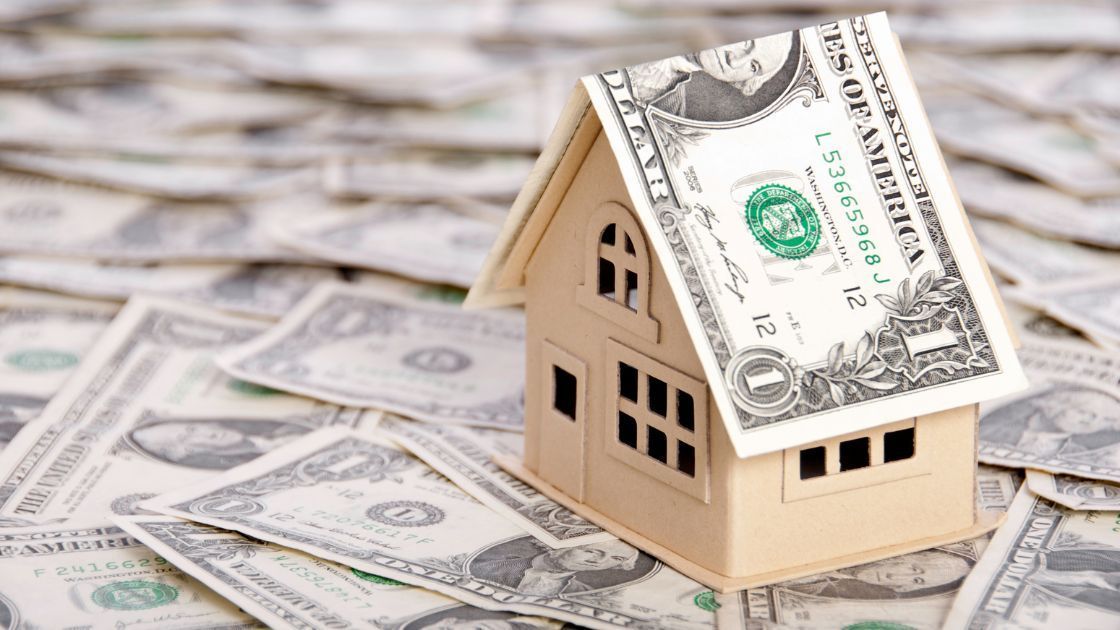How Much to Spend on Housing
Are you asking yourself how much is too much to spend on housing? I don't blame you! The crazy real estate market of the past few years has left many buyers wondering if they'll ever be able to afford a house. Or at least one that's livable!
The current market can leave you feeling overwhelmed and discouraged. As a result, you might be tempted to live beyond your means and buy a home above your budget. However, you want your home to be a blessing, not a source of stress! A mortgage that takes up a large percent of your monthly income is stressful and doesn't leave much room to reach other finance goals.
So how do you determine how much to spend on housing? It's simple, all you need is a good picture of your financial situation.
How Much to Spend on Housing

1. Total your monthly take-home pay.
First, total up your monthly take-home pay (after-tax pay) from all sources. If you're married, this should be your combined income.
2. Calculate 25% of this number.
A good rule of thumb is to spend no more than 25% of your monthly take-home pay on a fixed-rate, 15-year mortgage. Spending more than a fourth of your monthly pay on housing runs the risk of being house poor.
The 25% limit includes:
- Principal & interest
- Property taxes
- Homeowners insurance
- HOA fees
- Private mortgage insurance (PMI)
Don't rely on your mortgage loan officer to tell you what you can afford. When you get pre-approved for a mortgage loan, they will use their own criteria to determine the max amount they will lend you. Some banks will base their calculation on 40% of your gross income. Yikes! That doesn't leave much leftover for necessities, saving, or investing.
You should be in the drivers seat when determining how much house you can afford. This requires an understanding of your monthly income and expenditures (more on this in step 4).
3. Determine max purchase price budget.
Once you determine the max monthly mortgage payment you can afford, use this number to find your max purchase price. Ramsey Solutions has a handy online mortgage calculator to plug your numbers into and run some hypotheticals.
Keep in mind your max purchase price will be affected by how much you are able to put down, interest rates, mortgage term, etc.
When Should You Buy a House
You're ready to buy a home when you determine that you are financially ready.
Not when someone else says you are. Not because you got married a few months ago, not because your in-laws say you're wasting money on rent, not because interest rates are low, not because you feel like you have to buy a home before the market goes up again.
While the reasons listed above are good considerations, that's all they are- things to consider when deciding when the right time is to buy a home. They should not be the determining factor of whether you buy a home or not.
The truth is even if interest rates are low and the market is down, if you aren't in a good financial position to buy a home, the home will not be a blessing. Consider the following to determine whether you're ready to buy a home or not:
- You have an emergency fund. A good rule of thumb is to have 3-6 months of household expenses saved.
- You have saved at least 10% for a down-payment. While 20% is better, saving 10% will give you a good start!
- You're debt-free. When your income is tied up in monthly payments, it's hard to build wealth and reach your financial goals!
- Your spouse is in agreement. If married, being on the same page as your spouse is critical. If you aren't, don't move forward.
- You can cash-flow closing costs and moving expenses. Don't roll these into your loan and pay interest on them or put them on a credit card. The only debt you want to have outstanding is your mortgage.
- You're living on a monthly budget. Without a budget, you have no gauge of what you're spending every month, and therefore no way to tell if you can even afford the mortgage payment you're undertaking.
Once you have checked all the above off, you're ready to move forward with purchasing a home!
How to Save for a House
Saving for a home can be overwhelming when you look at how much it actually takes to put 20% (or even 10%!) of the purchase price down. Add in the crazy real estate market and skyrocketing home prices and you it can start to feel impossible! Tiny house, anyone? Kidding! Kind of ;)
Yes, purchasing a home is expensive and if you don't have a plan, you'll end up feeling stuck! Remember, there's always a way. It might take you longer than someone else, but with a plan you can accomplish anything!
Here are some ways to save money for a down payment:
- Set a clear savings goal. Once you determine how much you can afford (based on the 25% of your income rule), aim to save 10-20% of your max purchase price budget.
- Temporarily cut costs. There are so many ways to cut costs, but a few include: cancel subscriptions, complete a money saving challenge or no spend challenge, unsubscribe from emails that trigger impulsive spending, use cash envelopes, delete shopping apps from your phone, etc.
- Increase income if possible. Pick up extra shifts at work, get a part-time job on the weekends, deliver pizza, house-sit, pet-sit, babysit, sell stuff, start a low-cost side hustle, etc.
- Be patient. Don't let the red hot market cause you to make irrational decisions! It's really easy to get caught up in your emotions when you feel like it's now or never. Remember that decisions made in haste based on emotions usually cause regret.
FAQ's
Why 20%?
You might be wondering why having a 20% down payment is ideal. After all, it's not required and it seems like money you could put to better use... like decorating your new space!
Here's why putting 20% + down is ideal:
- Avoid PMI. If you put down less than 20% of the purchase price of the home, you'll have an added fee to your monthly mortgage payment. This fee is called Private Mortgage Insurance (PMI), which is a form of insurance that protects your lender from the risk that you'll default on your mortgage. PMI is a separate monthly fee and does not reduce the balance of your mortgage.
- Lower interest rate. Typically, the more you put down, the lower your interest rate. This is because the risk of default is lower- they are getting more of their money up-front, and thus don't bear as much risk.
- Smaller monthly payments. The more you put down, the less you have to finance. Consequently, the lower your monthly payment.
- Less interest. A portion of your monthly mortgage payment goes to interest (the interest portion of the payment should decrease over time as your balance lowers). If you have to finance less, the less interest you'll pay. This is a good thing, because interest does not reduce the balance of your loan. It's essentially your "fee" for borrowing money.
According to the National Association of Realtors, in 2021 the median percent down payment was 12%, and just 6% for the age group 22-30. This means buyers are financing on average 88% of the purchase price. Yikes!
Example
Let's compare two down payment scenarios. You are looking to buy a $300,000 home and put it on a 15-year, fixed-rate mortgage at 5.5% (we'll assume the interest rate doesn't change based on down payment amount even though it would).
20% down: If you put 20% ($60,000) down on the $300,000 mortgage, you would pay approximately $113,000 in interest over the life of the loan.
10% down: If you put 10% ($30,000) down on the $300,000 mortgage, you would pay approximately $127,000 in interest.
By putting down 10% instead of 20%, it adds $14,000 of straight interest to your loan (not including the additional $30,000 principal).
What are the differences in types of mortgages?
Buying a home can already be overwhelming, but add in trying to understand the different types of mortgages you can be enough to push you over the edge! Don't fall off just yet. Here's the basics of the most common types of home mortgages:
- Adjustable Rate (ARM) - this type of mortgage sounds attractive because it boasts an initially low-rate loan. However, after a defined period the rate fluctuates with the market , exposing the homeowner to significant risk.
- Federal Housing Administration (FHA) - this type of loan is designed for first time home buyers to make buying a home easier. These require as little as 3.5% down and are backed by the government. This type of loan now requires you to pay PMI over the life of the loan!
- Conventional Fixed Rate - A conventional fixed-rate loan locks you into an interest rate so you aren't subject to fluctuations. Your mortgage payment is the same every single month, no matter what current interest rates are at.
Personally, I believe a conventional fixed-rate loan is your best bet. While putting less down seems tempting, and a lower *initial* rate sounds good, you will likely end up paying more over the life of the loan. If it sounds too good to be true, it probably is!
Should I keep throwing away money on rent?
I know you'll hate this answer... it depends. Right now, it seems like it's hard to find an area where renting is actually cheaper than buying! Many times, it's only slightly cheaper than buying.
In the past, rent has typically been way less expensive than a mortgage payment. However, according to recent statistics, the current asking rent is only 12.95% lower than the average mortgage payment nationwide. Keep in mind depending on the area, it could be much lower or higher than the average.
The price of owning a home is less straightforward than renting. You have your mortgage, but you also have to factor in real estate taxes, homeowners insurance, utilities, PMI (if applicable), home repairs and maintenance, etc. Being a renter carries the benefit of not having to stress when the water heater breaks or the air conditioning needs replacing. Additionally, with renting, you're paying for flexibility. If you decide you want to move, you don't have to try and sell a house and worry about market conditions or interest rates. You can simply move!
If you get into a mortgage before you're financially ready, it will be a burden rather than a blessing!

Share this post!






















































































































